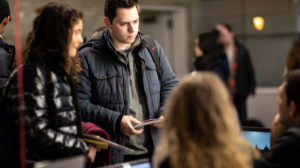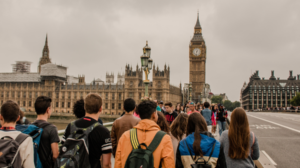The first week of classes here at University of Sydney is officially over! It was a busy week finding my way around campus and meeting lots of new people in my classes. Adjusting to class schedules and having to do homework again was an adjustment as I had thoroughly gotten used to (and enjoyed) the free evenings and weekends that had come along with the co-op cycle here at Northeastern. Having to spend this Sunday afternoon reading about Information systems and consumer behavior wasn’t the most exciting, but getting to do it in a local café with some Australian coffee and fresh made banana bread made the process a little better.
On top of the craziness of classes and homework, there have also been a number of other logistical processes to sort out since arriving here. From setting up my phone to opening a bank account, the past two weeks have been filled with a number of phone calls, appointments, and paperwork. To help future prospective students considering Sydney, I have compiled all of my research and findings into the best recommendations for these amenities.
Phone Services
When going abroad, it is essential you get an SIM card for your host country in order to have access to data, texts and calls. Whether or not your program requires a working phone while abroad or not, I cannot more highly recommend having one.
In order to activate your local country’s SIM card, your phone will need to be unlocked. Depending on your carrier in the States, it may already be unlocked to begin with (for example, all Verizon phones that support 4G or higher come unlocked now).If not, it is usually a fairly simple and straight forward process of searching your carrier and their unlocking policy online, then simply entering your details and phone number into a form online or over the phone. This guide helped me out a lot. I would recommend doing this before leaving home to have one less thing on your mind. Once its unlocked, all you need to do once you arrive in your host city is visit a local convenience store or mall, pick up a SIM card, and begin using your new service immediately.
In Australia, the most popular phone companies are Vodaphone, Optus, Telstra, and Virgin Mobile. I personally went with Vodaphone for their cheap student deals and high data allowances per month. Since I have an iPhone, I am able to iMessage a majority of my friends and family back home through data and can rely on talking to everyone else via Whatsapp or Facebook Messenger otherwise. Additionally, I have found wifi to be pretty spotty here Down Under, so am glad that I can rely on data when the wifi in my apartment or at school is inconsistent.
Banks
Whether or not you set up a bank account in your host country is up to you and certainly not as mandatory as setting up a phone is. When I was in London there wasn’t much of a need to open an account, as Bank of America’s sister bank, Barclays, allowed me to withdraw cash with little fees and a low conversion rate. However, I chose to open an Australian bank account here for ease of paying my phone bill, better conversion rates, and to avoid ATM and foreign transaction fees when taking out cash. Additionally, the accommodation I chose here in Sydney, Urbanest, requires an initial deposit to secure your room prior to arrival and the only way to get this deposit back at the end of the semester is through an Australian bank account. As I was not about to lose those $1,300, I needed to find a bank here.
After some initial research, I saw online that Westpac here in Australia (and New Zealand) had a relationship with Bank of America that would allow for simple transactions and low ATM fees. As a result, I was inclined to look into the Australian sister bank option here to open a checkings account. I was able to set up a savings and checkings account here for free with no minimum balances and no monthly fees. The process was pretty simple and the staff there was super friendly.
Another option that many students choose to set up an account with is Commonwealth Bank, who also has plenty of deals for students and doesn’t require any minimums.. Both Westpac and Commonwealth have ATMs all throughout the city and have been easily accessible. I recommend checking out either of those two.
Travel Card
As I mentioned in my previous post about my first week in Sydney, I have been a big fan of the public transportation here in Sydney. Travel via an Opal Card is simple and relatively cheap if you have a student card. Opal services offer a special “concessions” card for students enrolled in eligible universities during their time in University. It’s a great deal and a serious discount on each ride (and something the MBTA should definitely consider for us Boston students!).
In order to receive a concessions student card, you must first apply through your host institution, then online through Opal’s website. After doing this, you will receive your special concessions card in the mail a few days later. Although a fairly simple and straight forward process, I would be sure to apply for this card through your host institution prior to arriving to Sydney, as it can take some time for the school to process your request. Once receiving your card, you are able to travel with fares half the price of the Adult Opal card on all transportation (both local and regional trains, buses, lightrail, ferries) and save up to 30% on off peak train fares. Additionally, you’ll never pay more than $7.70 a day or $30.80 a week. These discounts are really helpful when looking to plan local day or weekend trips and helping you get around and sightsee throughout the city.
Future Travel
With these recommendations in mind, don’t forget to have a general plan for your time here in Sydney! Before you know it, weekends start flying by and suddenly the semester is half over. Start planning weekend trips and spring break trips early to avoid missing out on any potential travel. You’re only abroad once, make the most of your time!
My roommates and I have already started to plan some weekend trips and our general plan of action for spring break. We are trying to balance maximizing the number of cities we see in Australia while also exploring and getting to see the most that we can in Sydney. This has required planning our weeks ahead of time to allow time to play tourist between classes while also getting our homework done on time to allow for weekend travel and time for planning future trips. The most important thing about being abroad is time management, so come prepared to plan!
Next weekend I leave for my second weekend trip. I’m heading up north to Hunter Valley Port Stephens for a program put on by USyd called “Orientation Escape”. We will be going to one of Australia’s most famous wine regions, attending two wineries and a brewery tasting, visiting the Australian Reptile Park, sand-boarding down some dunes to the west, and going on a dolphin/whale watching cruise. I’m excited to experience these multiple quintessential Aussie experiences, stay tuned!











